Posted on 10/31/2023
%20copy.jpg)
You find a pool of mysterious liquid beneath your car - the telltale sign of a leaking radiator, and your heart sinks - what now? While the usual suspects often come to mind, there exist enigmatic causes that can leave even the most seasoned car owners scratching their heads. Unraveling the uncommon mysteries behind a leaking radiator isn't just a task of repair - it's a journey of understanding the intricate nuances of your car's cooling system. Join us as we venture into the unexpected culprits lurking behind this automotive anomaly. Corrosion Conundrum While corrosion isn't a novel concept in the world of automotive maintenance, its role in causing a leaking radiator often remains underestimated. The gradual buildup of rust and debris within the radiator can weaken its structural integrity, leading to unexpected leaks. Over time, the acidic nature of coolant and the introduction of exte ... read more
Posted on 9/30/2023
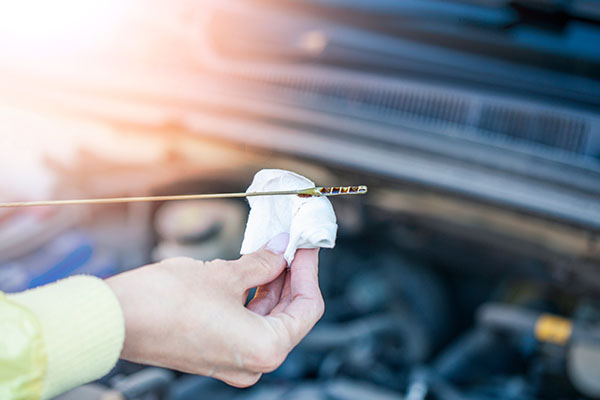
Your vehicle is more than just a machine - it's a trusted companion on the road of life. Yet, to keep this partnership flourishing, one must embark on a journey known as routine maintenance. Imagine it as a symphony of checks, balances, and fine-tuning, all orchestrated to ensure your cherished vehicle continues to purr like a contented feline. 1. Reliability Unleashed Routine maintenance visits are the key to unlocking your vehicle's full potential. From oil changes to filter replacements and tire rotations, these visits keep your car's vital components in top shape. This, in turn, translates to enhanced reliability, ensuring your car is ready to start without hesitation, even on the coldest of mornings. 2. Safety Elevated Your car is more than just a mode of transportation; it's a sanctuary for you and your loved ones. Regular maintenance checks inspect critical safety features like brakes, tires, and lights. Neglecting these coul ... read more
Posted on 8/31/2023
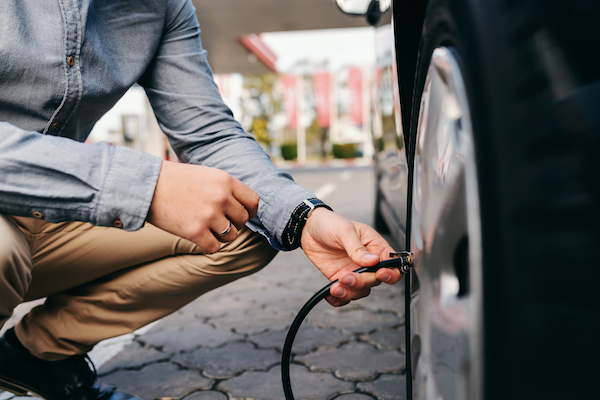
Proper tire pressure is not just about ensuring a smooth ride – it's a fundamental aspect of vehicle safety and performance. Underinflated or overinflated tires can lower fuel efficiency, reduce handling, and even cause tire blowouts. Today, we are here to teach you how to measure tire pressure correctly. It is a simple yet essential skill for every car owner. What You'll Need: Tire pressure gauge Knowledge of the recommended tire pressure for your vehicle (found in the owner's manual or on a sticker inside the driver's door frame) Steps to Measure Tire Pressure: Park and Prepare: Park your vehicle on a level surface and engage the parking brake. Make sure the tires are cold, as tire pressure increases as the tires heat up from driving. Locate Valve Stem: Remove the valve cap from one of the tires. The valve stem is a small, cylin ... read more
Posted on 7/30/2023
.jpeg)
Imagine taking a deep breath in a room filled with dust and debris. Not the most pleasant experience, right? Your car's engine feels the same way when it breathes in unfiltered air. That's where the air filter comes into play. This often-overlooked component is vital in keeping your engine clean and your ride smooth. So, the burning question is: How often should you change your car's air filter?The Frequency Factor: While no definitive answer applies to all vehicles, experts generally recommend changing the air filter every 12,000 to 15,000 miles or once a year, whichever comes first. However, this interval can vary depending on your driving conditions. If you frequently drive in dusty or polluted environments, inspecting and changing the air filter more frequently is recommended. Visual Inspection: One way to determine if your air filter needs replacing is through a visual inspection. Simply pop open your car's hood ... read more
Posted on 6/30/2023
.jpeg)
There can be a lot of confusion when it comes to the various fluids that keep our automobiles running smoothly and efficiently. One common question that often arises is whether differential fluid and transmission fluid are the same. While they both play crucial roles in the overall performance of your vehicle, it's essential to understand that differential fluid and transmission fluid are not interchangeable. Let's start by demystifying the differential and its purpose. The differential is a component found in vehicles with rear-wheel drive or all-wheel drive systems. Its primary function is to distribute power between the wheels while allowing them to rotate at various speeds, especially during turns. The differential fluid, also known as gear oil, is specifically formulated to lubricate and protect the gears and bearings within the differential housing. On the other hand, transmission fluid is responsible for lubricating and cooling the intricate components ... read more
Posted on 5/31/2023

Do you notice your headlights or taillights flickering or dimming while driving? It's a common issue that many car owners face, and it can be a significant safety concern if not addressed promptly. Dim or flickering lights can compromise your visibility while driving at night or during bad weather conditions, which is why it's important to have your car checked by a professional mechanic if you notice these symptoms. There could be several reasons why your headlights or taillights are flickering or dimming. One of the most common causes is a faulty alternator or battery. If the alternator or battery isn't supplying enough power to the lights, they'll start to flicker or dim. Another reason could be a loose or corroded wire connection, which can prevent the proper flow of electricity to the lights. In some cases, the center of the problem could be with the voltage regulator, which r ... read more
Posted on 4/25/2023

Spring is a great time to give clean and recover your vehicle after the long, harsh winter. Taking care of your car not only ensures it runs smoothly but also helps to extend its lifespan. Here are some spring car care tips to help get your vehicle ready for the warmer months ahead: Change the Oil and Oil Filter: Regular oil changes are key to keeping your car running smoothly. Spring is the perfect time to get your oil changed and have your oil filter replaced. Oil change services done at University Chevron can ensure that your motor is protected and running at peak performance. Check the Tires: The harsh winter can take a toll on your tires, so please remember to check them for any signs of wear and tear. Check the tire pressure and make sure it’s at the recommended level for your vehicle. Also, check the tread depth and look for any cuts, punctures, or bulges. Inspect the Brakes: Your brakes are one of the most critical saf ... read more
Posted on 3/30/2023
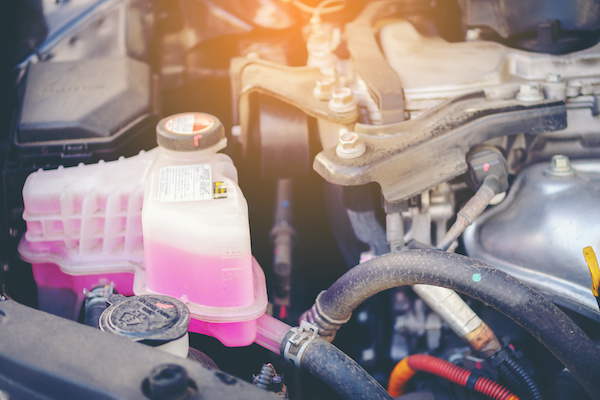
The cooling system in a vehicle plays an integral role in maintaining the engine's temperature, ensuring it runs right, and doesn't overheat. The system is made up of several different parts, each with its own important function. Let's take a closer look at what parts make up the cooling system. Radiator: The radiator is the most recognizable part of the cooling system. It is a heat exchanger that transfers heat from the engine coolant to the air passing through it. The radiator is typically located behind the grille at the front of the vehicle. Water Pump: The water pump is responsible for circulating coolant throughout the engine and the cooling system. It's usually driven by a belt connected to the engine's crankshaft. Thermostat: The thermostat is a temperature-sensitive valve that regulates the flow of coolant through the engine. It stays closed until the engine reaches its operating temperature, then opens to allow coolant to flow through the system. Coola ... read more
Posted on 2/28/2023
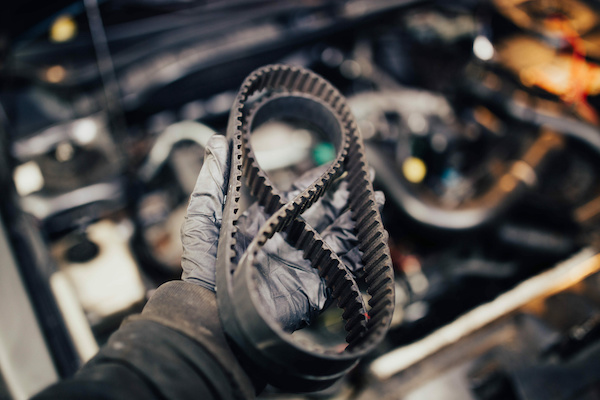
The timing belt is one of the most important components in a vehicle's engine. It is responsible for synchronizing the engine's camshaft and crankshaft, which ensures the engine's valves open and close at the correct times. A worn or aging timing belt can cause significant engine damage, so it's important to be aware of the signs that your timing belt may need to be replaced. Age: Timing belts are typically designed to last between 60,000 and 100,000 miles, depending on the make and model of your vehicle. If your vehicle is approaching the upper limit of its timing belt's lifespan, it may be time to have it inspected. Cracks and fraying: A visual inspection of the timing belt can reveal signs of wear and tear, such as cracks and fraying. If you notice these signs, it's important to have your timing belt inspected as soon as possible. Engine misfires: If you're experiencing engine misfires or a decrease in engine performance, it could be a sign of a worn o ... read more
Posted on 1/30/2023
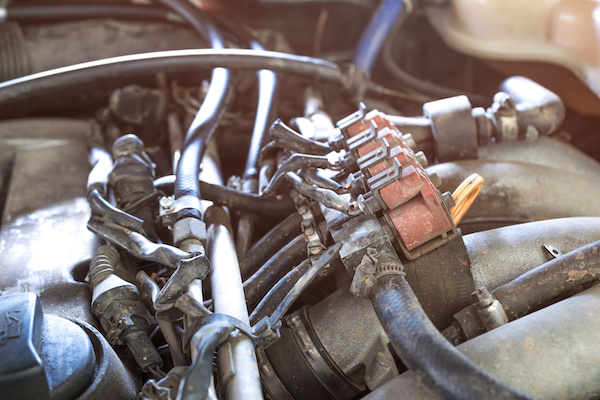
The fuel system is one of the most underrated parts of the motor vehicle. It has the important task of bringing the right amount of fuel to the engine at the right time. Otherwise, too much or too little fuel can cause significant performance issues. Over time, the parts of the fuel system can get messy. To maintain your vehicle’s efficiency and consistent performance, you must have the injectors, and other critical components cleaned. It is a part of maintenance that tends to get overlooked, but it can make a world of difference in how your car runs. Let’s discuss the fuel injectors specifically. They are part of the fuel system most likely to have carbon buildup. The injectors are the parts the fuel passes through before it gets burnt. When the injectors get clogged, it can severely impact how your vehicle runs. To get a nice balance of fuel and air for the engine, you will need to flush and clean out the build-up. It can be professionally done here at University ... read more